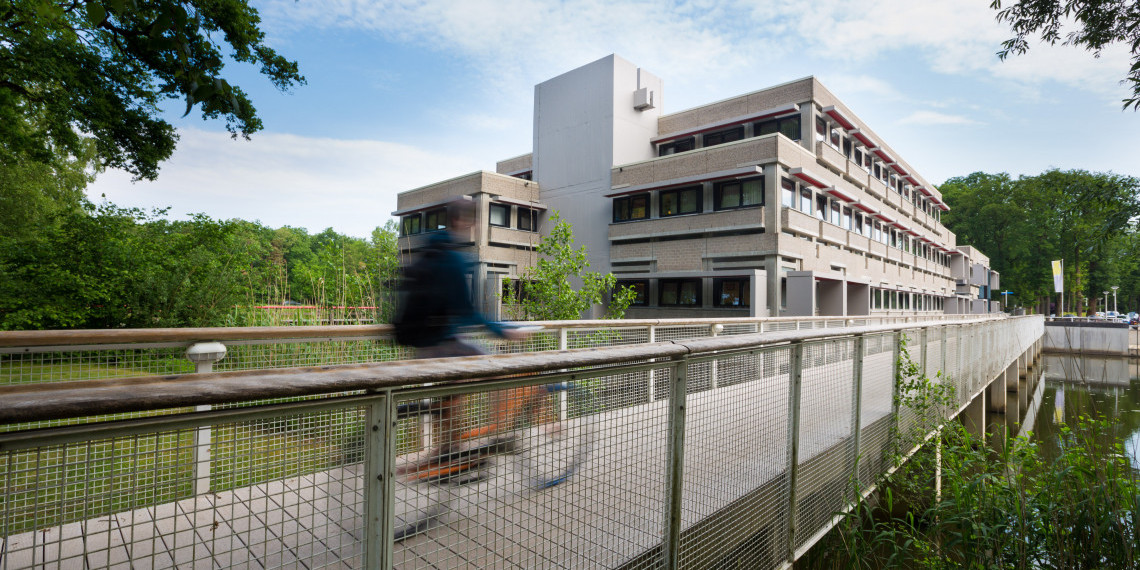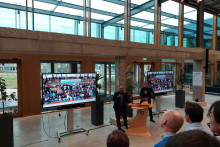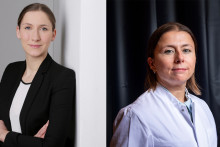'Well, the psychology programme is one of the first I would turn back to Dutch.' NSC leader Pieter Omtzigt does not mince words in late October, during the first election debate at College Tour. A day after the elections, NWO president Marcel Levi reacts to the possible consequences for higher education and science. 'I do dare say out loud that I wonder why we offer English-language psychology programmes. What does the Netherlands gain from that?'
These two quotes hint at the possibility of major changes ahead for English-language bachelors such as psychology. Will the programme still be offered in English in a few years' time? And what will that mean for the many international - mainly German - students?
Language matters
Master's student Marcel Mertens (24) says he finds the discussion interesting to follow. The German will soon complete his master's, speaks Dutch at conversational level, but does not intend to work full-time in the Netherlands. He is thus an example that critical politicians often cite to intervene in higher education. Why educate foreign students who will leave again after graduation? 'And yet I understand the criticism well. Psychology is pre-eminently a subject where language is very important. It is logical that the Dutch language is preferred in the Netherlands. Learning psychology in English creates an extra layer of translation in practice. That creates extra work.'
'I pay taxes here, I work in the Netherlands and pay tuition fees' - Marcel Mertens
But, Mertens points out, his opinion is balanced. He notices that he and his fellow students appreciate education in Twente. 'And I do not share the argument that international students do not bring profit to the Netherlands. I pay taxes here, I work in the Netherlands and pay tuition fees. I participate as a citizen, just like fellow Dutch students.'
The student hopes that politicians will look less at nationality and more at the broader picture in decision-making. 'Psychology serves a greater purpose than your nationality. Good education should cross borders and science is global. What could be better than using and spreading leading Dutch knowledge worldwide to help people?'
International perspective
Her surname suggests that Roseanne Künne (20) has a similar background to Mertens, but third-year bachelor Künne is Dutch. She says that in her search for a suitable study she very consciously chose an English-language course. 'That seemed more interesting to me and then there is more to learn. I have an international perspective on society and especially the research side of the programme has much more value in English.'
Künne thinks the English language of instruction adds a lot and she does not share the critical voices from politics. 'Studying and learning among other cultures makes me a better professional. It gives a broader view of the world. It can't be that selection holds back Dutch students, but otherwise quality should be leading in my opinion.'
'I have to be honest: English was a challenge in the beginning' - Otto Joosten
She does not hope that the English language of instruction will disappear in the programme. 'I think the argument that students starting work in the Netherlands must necessarily speak Dutch is outdated. The Netherlands is becoming increasingly international and besides: not all graduates go to work in therapy.'
Challenge
This is also how 21-year-old Otto Joosten sees it. The bachelor student from the Dutch province of Gelderland consciously looked for a programme where he could work with international students. 'I have to be honest: English was a challenge in the beginning, but a challenge I wanted to take on. I see the language as a plus. I don't think my education, or my knowledge would have been of a higher level if I had been lectured in Dutch in recent years.'
Why do so many German students choose to study psychology in Twente?
Psychology at UT consists largely of German students. This is due to the so-called numerus clausus in Germany for psychology. Students in Germany are only admitted to universities with very high grades, so young people often choose to enrol in the Netherlands.
The bachelor of psychology at UT has had a numerus fixus since academic year 2022-2023. This means that no more than 350 first-year students may enter each year.
During a lecture, Oosten occasionally sees a lecturer or fellow student who gets stuck for a moment in the translation of a term. 'I understand the discussion going on. Teaching in Dutch in the Netherlands also sounds very logical, but I think the English language actually enriches the study, instead of hindering it. And should I pursue a master's degree abroad, my English base is also a plus.'
Marie Klinge (24) was pursuing a bachelor's degree in psychology in Enschede. The German explains in perfectly understandable Dutch that in September she applied for a job at an employment agency in the eastern Netherlands. 'The vacancy was in Dutch. I decided to just go for it and I have now been working there for several months with great pleasure. Because of the job, I am now brushing up my Dutch for 32 hours a week.'
The technical touch
Klinge was qualified to be admitted to a German university, but chose Twente. Because of the technical touch, but also because of the language of instruction. 'I knew at a young age that I wanted to study in English. A world language that gives you many more options. The language was never a barrier for me on campus. By the way, many sections in psychology are English by themselves, such as the DSM (Diagnostic and Statistical Manual of Mental Disorders) manual or European regulations.'
'I do think the university should insist more strictly on learning Dutch' - Marie Klinge
In her second year, Klinge decided she wanted to give preference to a career in the Netherlands. That's when she started Dutch lessons. Because of her surroundings and job, she is approaching full command of the language. 'I understand this discussion very well. Language is especially culturally important. And I don't see the added value of bringing students from all over the world to Twente, only to see them fly out again. I support the mission of Keeping Talent in Twente.'
Klinge just doesn't think that switching back to Dutch will provide solace. 'Especially not for students, because publishing in Dutch automatically ensures less impact. I do think the university should insist more strictly on learning Dutch from the first year if you want to study or work here.'
The four share a piece of advice for decision-makers in The Hague: offer a second line in the programme, so that students can choose a Dutch or English path. Or do so partially, so that more therapy-focused material can be offered in Dutch and the research subjects in English. Whether their wish will become reality, the future will tell.
U-Today brings an interview with BMS dean Tanya Bondarouk and vice dean of education Ciano Aydin on Friday about the debate on internationalisation.








